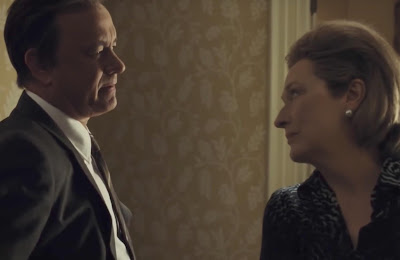skip to main |
skip to sidebar
Review: THE POST (dir. Spielberg)

'The story opens in 1966 in the jungles of Vietnam, where government analyst Daniel Ellsberg (Matthew Rhys) hears the secretary of defense, Robert McNamara (Bruce Greenwood), complaining that the war is being lost, only to watch him turn around and say the exact opposite at an airport press conference upon their return to Washington. Sickened by the disparity, Ellsberg takes it upon himself to secretly copy the top-secret 47-volume, 7,000-page Department of Defense study of the war which U.S. leaders admitted was lost from the get-go. After the spookiest of photocopying scenes, with shadows cast by the moving bar walking up the ceiling and walls, the papers arrive on the desk of the Post’s rakish editor Ben Bradlee (Tom Hanks) in nothing more ceremonious than a shoe-box — a detail of surpassing Spielbergian ordinariness. When it comes to presenting us with the extraordinary, historical or otherwise, Spielberg likes his paperwork. It brings out the Rockwell in him. Close Encounters of the Third Kind and E.T. both took their names from snippets of officialese. Schindler’s List took its theme not from the the horrors of the Holocaust but its bureaucracy. Private Ryan is plucked from the battlefield by a bit of sharp-eyed admin. Liz Hannah’s script has it’s share of bromides defending truth, justice and the American way, but by framing the story as a business story, Spielberg keeps any high-mindedness at heel. With its busy rhythms and urgent camerawork, The Post moves like a thriller, or a domino cascade, each image impelling on the next in irresistible sequence until the larger pattern is revealed — from pay-phones with dangling receivers to pounding type writers and the sight of journalists shouting excitedly with one another in Bradlee’s living room, while his daughter makes a killing on lemonade. “My God, the fun,” Hanks remarks at one point and it is fun: Spielberg has finally found a way to make his civics-class movies as enjoyable as his adventures used to be. His shot-making is as industrious as a humming-bird these days, but one shot, in particular, is inspired. Nixon has issued a court order blocking publication. The Supreme Court, and possibly prison, awaits. Half a dozen advisors are on conference call awaiting Graham’s decision, and as she gathers herself, the camera prowls the ceiling like a circling hawk, or a cloud of thoughts demanding release. Finally, a decision comes. “Let’s publish,” she says out of nowhere, almost as surprised by herself as everyone else is — as if such a momentous decision could only sneak up on her, a last-minute jumping of the tracks designed to outwit Kay’s ingrained habit of second-guessing herself. That this champion of the free press should be wearing a milky-white evening wear caftan only reinforces your sense that, with impeccable timing, Spielberg has made his first explicitly feminist film. It’s also the closest Streep will probably ever come to making a superhero movie. She modulates her performance beautifully. First seen walking into roomfuls of men where she is surrounded by dark suits, Kay hmms and haws, is spoken over, or for. But gradually, Streep lends her strength, locating the steel behind her feathery voice, as Kay realises that she’s not just the caretaker of her late husband’s company. It’s her company now. The suits scatter. The caftan wins.' — from my Sunday Times review























This really answered my problem, thank you!
ReplyDeleteClick Here
Visit Web
Forosx.com
Nice Blog. Thanks for sharing with us. Such amazing information.
ReplyDeleteOnly Blog
Guest Blogger
Guest Blogging Site
Guest Blogging Website
Guest Posting Site
and I would like to get furthur information in your articles.
ReplyDeleteMy blog also has articles on these topics, so I look forward to your visit.
ReplyDeleteI was very impressed when I found your writing.
ReplyDeleteThen I accidentally found your article. I can refer to a variety of materials,
ReplyDeleteThanks For sharing such valuable information.
ReplyDeleteHi there, I enjoy reading all of your article.
ReplyDeleteThanks and Best of luck to your next Blog in future.
ReplyDeletePls check out my web site as well and let me know what you think.
ReplyDeleteYour information was very useful to me.
ReplyDeleteThanks you for this. Read this blog. It is always so lovely.
ReplyDeleteI’ve been watching out for your content..D.
ReplyDeleteIf ever you have some more updates please do notify me..D.
ReplyDeleteI have visited your website ever since and it didn’t fail me. .D.
ReplyDeleteThis is indeed an interesting read. .D.
ReplyDeleteI love sharing the content I receive here, so much good information. .D.
ReplyDeleteThanks for sharing this type of useful articles to read, have a good day
ReplyDeleteI must say you are an incredible writer, I love the way that you describe the things
ReplyDeleteI really appreciate reading this blog it is very impressive and informative content
ReplyDelete